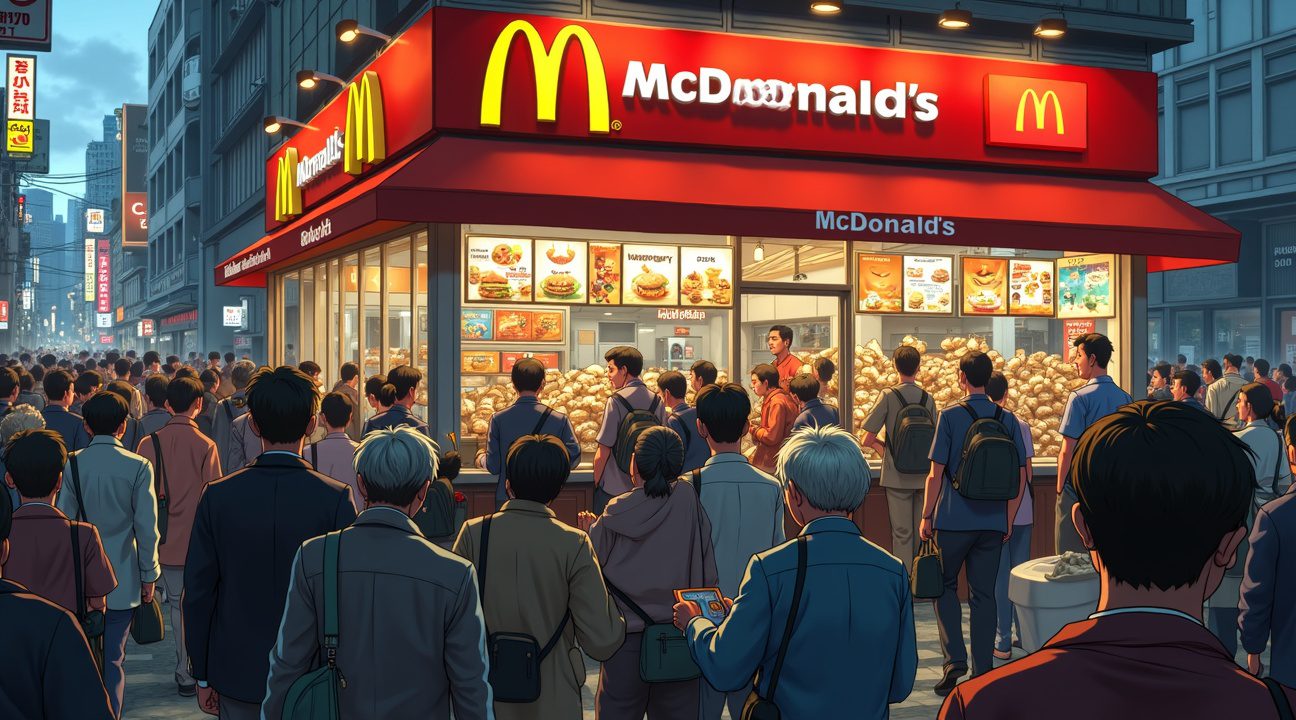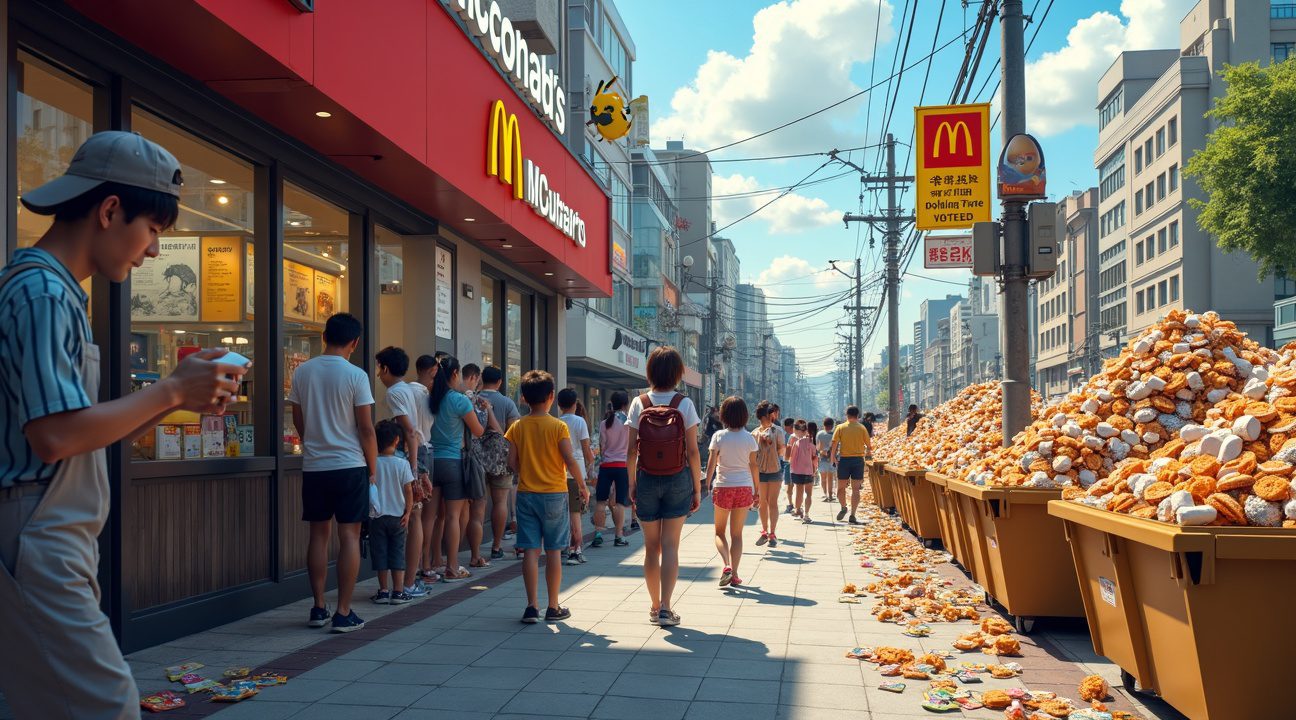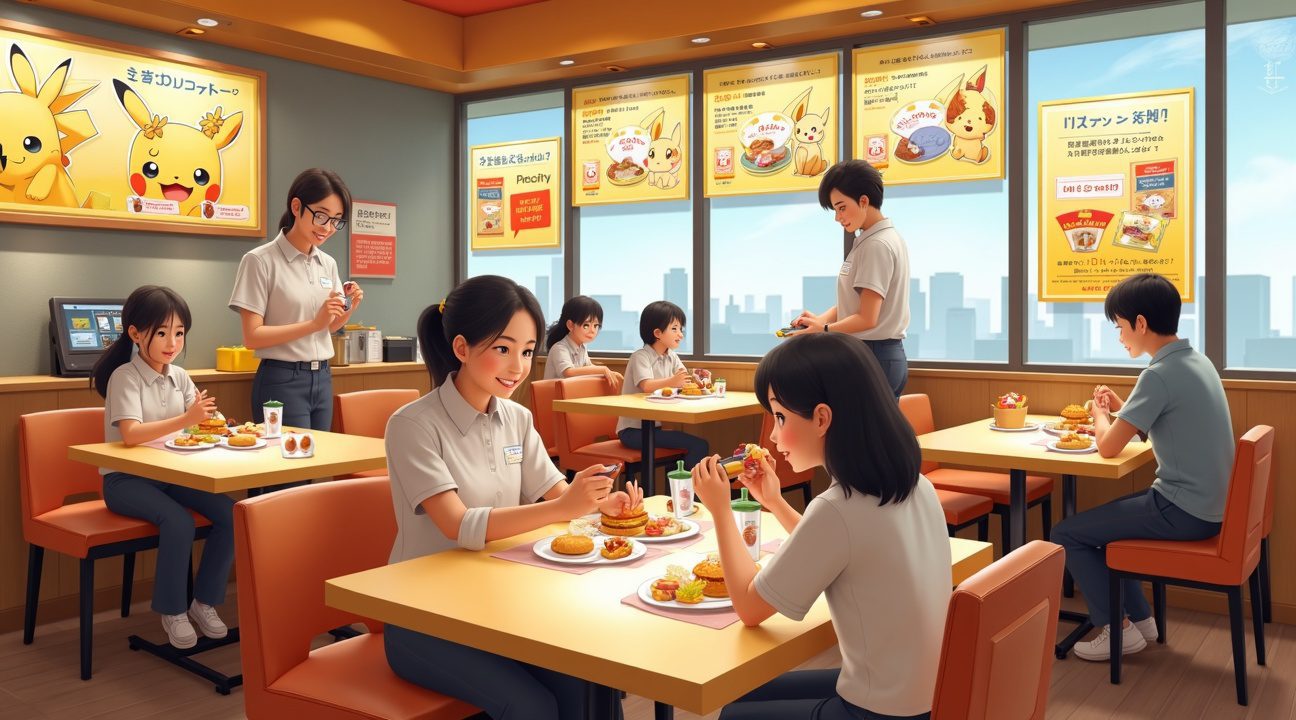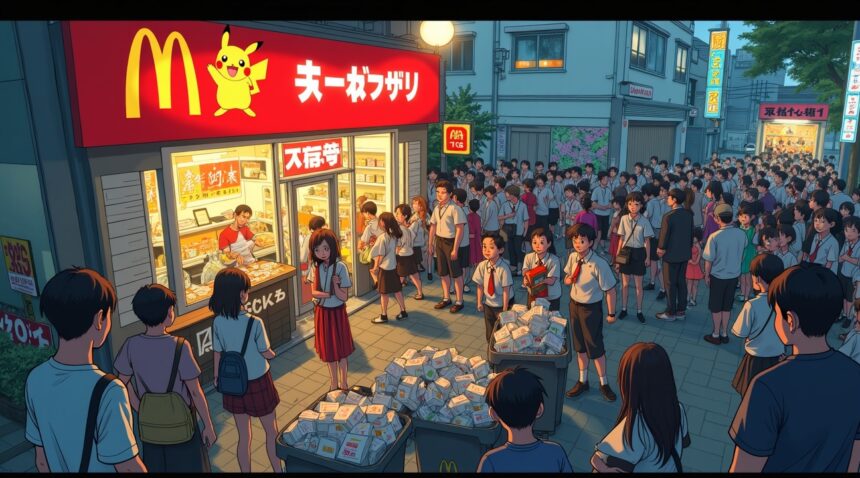McDonald’s Japan issued a public apology following the collapse of its August 2025 Pokémon TCG Happy Meal campaign, which was derailed within hours by scalpers and bulk buyers, leading to massive food waste, public disruption, and failed access for intended families.
Background and Campaign Failure
The limited-time promotion, tied to the wildly popular Pokémon Trading Card Game, was intended to engage children and families with exclusive cards included in Happy Meals. However, the campaign lasted less than a day due to unprecedented demand from resellers who overwhelmed restaurants across Japan.
Scalping and Food Waste
McDonald’s faced widespread criticism after scalpers purchased massive quantities of Happy Meals just to obtain the collectible cards. This behavior led to:
- Thousands of pounds of uneaten food dumped in local dumpsters and parking lots
- Severe disruption of normal restaurant operations due to overwhelming crowds chasing limited merchandise
- Legitimate families unable to participate in the event due to depleted supplies within hours
Employee Safety and Community Impact
According to reports, the promotion’s chaos also extended beyond the stores themselves:
- McDonald’s staff endured dangerous and high-pressure environments, dealing with stress, overwork, and hostile customers
- Local businesses suffered from traffic congestion, blocked entrances, and reduced access due to massive queues
Meanwhile, the cards originally sold with a $3.40 Happy Meal quickly surged in resale value. Within 24 hours, packs were fetching $20–$30 on secondary markets, and some sealed booster packs reached prices of up to $200.
Company Response and Policy Changes
Apology and Admission
McDonald’s Japan issued a formal apology, acknowledging poor planning and a failure to anticipate unethical mass-purchasing behavior. The company emphasized its rejection of resale profiteering and food waste, calling the events of the campaign unacceptable.
New Measures to Combat Scalping
To prevent similar occurrences in future promotions, McDonald’s rolled out several new policies:
- A three-Happy-Meal-per-group purchase limit during special campaigns
- Implementation of account monitoring systems to flag excessive orders and anomalies
- Mandatory staff training on campaign-specific abuse detection
- Collaboration with resale platforms to remove listings with inflated prices
Future Campaign Strategy
Following the controversy, McDonald’s Japan postponed other anime-themed campaigns. The company is now shifting focus to better-protected, family-focused promotions, with potential moves such as:
- Temporarily disabling mobile and online ordering during high-demand events
- Introducing digital pre-registration or lottery systems to allocate limited content fairly
For more information about the company’s updated promotional approach and full public statement, visit McDonald’s Japan official website.
McDonald’s Japan Issues Formal Apology Following Pokémon Campaign Disaster
McDonald’s Japan found itself at the center of a major controversy following its August 2025 Pokémon TCG Happy Meal campaign, which spiraled into chaos due to scalpers and bulk buyers. The fast-food giant issued a comprehensive public apology acknowledging the serious problems that emerged from poor campaign management and inadequate preparation for the overwhelming demand.
The apology addressed multiple affected parties, including customers who couldn’t access the promotion, employees who faced dangerous working conditions, and nearby residents and tenants who dealt with significant disruption. McDonald’s specifically stated: “We sincerely apologize for the inconvenience. McDonald’s does not tolerate the purchase of Happy Meals for the purpose of resale, or the abandonment or disposal of food.”
Campaign Fallout and Community Impact
The Pokémon promotion quickly devolved into pandemonium as scalpers purchased massive quantities of Happy Meals solely for the collectible trading cards. This behavior created several serious problems that extended far beyond McDonald’s restaurants. Long lines formed outside locations, causing traffic congestion and blocking access to neighboring businesses. The situation became so severe that some locations had to implement crowd control measures.
Food waste reached alarming levels as bulk buyers discarded the actual meals after extracting the Pokémon cards. Videos circulated on social media showing dumpsters overflowing with barely touched Happy Meals, creating both environmental concerns and public relations nightmares. The wasteful behavior contradicted McDonald’s sustainability initiatives and sparked outrage among consumers who witnessed the blatant disregard for food resources.
Employee safety became a pressing concern as staff members faced aggressive customers demanding large quantities of Happy Meals. Some locations reported verbal confrontations and disputes over purchase limits. The stress on restaurant teams intensified as they struggled to serve regular customers while managing the chaos created by the Pokémon campaign.
Corporate Response and Future Measures
McDonald’s Japan’s formal apology represented an unusual step for the corporation, which typically handles promotional issues through standard customer service channels. The public nature of the statement indicated the severity of the situation and the company’s recognition that standard damage control wouldn’t suffice. The apology specifically mentioned the company’s intolerance for resale activities and food abandonment, signaling potential policy changes for future promotions.
The incident highlighted fundamental flaws in McDonald’s promotional strategy and scalper prevention measures. Unlike other companies that have successfully implemented purchase limits, verification systems, or lottery-based distribution methods, McDonald’s appeared unprepared for the predictable surge in demand. The company’s failure to anticipate scalper behavior, despite previous incidents with collectible promotions, demonstrated poor strategic planning.
This situation mirrors broader issues within the collectibles market, where scalpers frequently target limited-edition items. The Pokémon Company has faced similar challenges with various product launches, suggesting that collaborative efforts between licensors and retailers might be necessary to prevent future incidents.
McDonald’s response included promises to review promotional procedures and implement better safeguards for future campaigns. The company indicated it would explore measures to prevent bulk purchasing while ensuring legitimate customers can participate in promotions. However, specific details about these preventive measures weren’t disclosed in the initial apology statement.
The incident also raised questions about corporate responsibility in managing limited-edition promotions. Critics argued that McDonald’s should have anticipated the scalping problem and implemented protective measures before launching the campaign. The company’s reactive approach, rather than proactive planning, contributed to the severity of the situation and the need for such an extensive public apology.
https://www.youtube.com/watch?v=mzKhWc18F8c

Pokemon Campaign Ends in Chaos Within Hours of Launch
The Pokémon TCG Happy Meal promotion in Japan transformed from an anticipated family event into a chaotic disaster within hours of its August 9, 2025 launch. McDonald’s had originally planned for the campaign to run for three days, but overwhelming demand from scalpers forced an early termination that left the fast-food giant issuing formal apologies.
Photos from various McDonald’s locations across Japan painted a disturbing picture of the promotion’s failure. Long lines stretched around city blocks as bulk buyers descended on restaurants with coordinated purchasing strategies. Heated arguments erupted between frustrated families and aggressive scalpers, creating hostile environments that drove away the intended audience of children and parents.
Massive Food Waste Accompanies Card Frenzy
The most shocking aspect of the promotion’s collapse centered on the massive food waste generated by bulk buyers who purchased Happy Meals solely for the collectible Pokémon cards. Reports documented thousands of pounds of untouched food being abandoned in parking lots and thrown into dumpsters behind McDonald’s locations. Entire meals were left scattered on tables as purchasers extracted the cards and departed without consuming anything they’d bought.
This behavior directly contradicted the promotion’s original intent to combine family dining with collectible entertainment. Instead of creating positive memories around shared meals, the campaign became synonymous with waste and greed. Social media users quickly dubbed the failed promotion the “Unhappy Meals,” a label that captured public sentiment about the event’s outcome.
The economic impact on both families and scalpers became immediately apparent as cards originally bundled with ¥500 Happy Meals began appearing on resale platforms. Individual cards that cost approximately $3.40 USD as part of a meal started selling for $20–$30 on secondary markets. Sealed packs commanded even higher prices, with some reaching $200 per pack within 24 hours of the promotion’s launch.
McDonald’s staff found themselves overwhelmed by the sheer volume of customers and the aggressive tactics employed by professional scalpers. Many locations implemented informal limits on purchases per customer, but these measures proved insufficient against organized buying groups. Some scalpers reportedly used multiple family members and coordinated timing to circumvent purchase restrictions.
The rapid sellout of cards within a single day highlighted the disconnect between McDonald’s expectations and market reality. Pokémon’s enduring popularity in Japan should have signaled the potential for excessive demand, but the company appeared unprepared for the scale of scalper involvement.
Restaurant managers described scenes reminiscent of limited product launches rather than routine meal promotions. Customers arrived before opening hours and waited in lines that disrupted normal business operations. The atmosphere grew increasingly tense as legitimate families realized they had little chance of obtaining cards for their children due to bulk purchasing by resellers.
The failure extended beyond simple supply and demand issues. McDonald’s faced criticism for not implementing adequate safeguards against bulk buying from the campaign’s inception. Other companies had previously encountered similar issues with Pokémon promotions, providing clear precedent for potential problems.
The environmental impact of discarded food waste generated additional negative publicity for both McDonald’s and The Pokémon Company. Images of untouched meals filling dumpsters contradicted both companies’ stated commitments to sustainability and responsible consumption. This visual evidence of waste amplified public criticism and damaged brand reputations beyond the immediate promotional failure.
Within hours of launch, McDonald’s executives recognized that the promotion had spiraled beyond their control. The company’s decision to end the campaign early prevented further chaos but also highlighted their lack of preparation for predictable scalper behavior. The formal apology that followed acknowledged these failures while promising improved measures for future promotions.

Community Backlash and Demands for Stronger Action
The formal apology from McDonald’s triggered widespread criticism from frustrated customers and local residents who felt the fast-food chain’s response fell short of addressing the core issue. Social media platforms quickly filled with angry posts from parents who couldn’t secure Pokemon Happy Meals for their children, while scalpers continued to profit from what many considered a family-oriented promotion.
Public Outcry Over Unfair Access
Parents voiced their frustration about being unable to purchase meals for their children due to bulk buyers clearing out entire restaurant inventories. Images of discarded food began circulating online, showing how scalpers would purchase dozens of Happy Meals solely for the Pokemon cards while throwing away the actual meals. This waste particularly angered community members who viewed it as both environmentally irresponsible and morally questionable.
The situation mirrors other Pokemon-related controversies, including instances where competitive gaming has led to conflicts, though this McDonald’s campaign represented a different type of community tension focused on retail access rather than gameplay disputes.
Proposed Solutions from the Community
Frustrated customers didn’t just complain—they offered specific solutions to prevent future scalping incidents. The most popular suggestions included:
- Limiting Happy Meal purchases to parents accompanied by children
- Requiring proof of Japanese residency for bulk purchases
- Implementing daily purchase limits per customer
- Creating reservation systems for Pokemon promotional items
- Establishing separate collection times for families versus collectors
Many customers pointed out that other retailers had successfully implemented anti-scalping measures for popular collectibles, questioning why McDonald’s hadn’t prepared similar safeguards given the predictable demand for Pokemon merchandise. The backlash extended beyond individual complaints to broader discussions about corporate responsibility in managing promotional campaigns that target both children and adult collectors.
Critics also highlighted how the controversy damaged McDonald’s reputation as a family-friendly restaurant, with some parents stating they would avoid the chain until stronger protections were implemented. The incident sparked conversations about whether companies should prioritize profit from bulk sales or maintain accessibility for their intended audience, particularly when promotions involve children’s meals and toys.
The community’s response demonstrated how Pokemon’s enduring popularity continues to create challenges across various industries, similar to ongoing franchise developments that generate intense consumer interest and competition for limited merchandise.
New Restrictions and Anti-Scalping Measures Implemented
McDonald’s Japan responded to the scalping crisis with comprehensive new policies that fundamentally changed how customers can purchase promotional items. The company instituted a strict three Happy Meal limit per group, a significant reduction from previous campaigns where bulk purchases weren’t restricted. This limit applies across all ordering methods, including in-store purchases and delivery applications.
Staff received training to actively refuse larger orders and identify customers attempting to circumvent the restrictions. McDonald’s also implemented account monitoring systems that flag suspicious ordering patterns and permanently ban delivery app accounts used for excessive purchases. The most dramatic change involved completely disabling online and mobile ordering for certain high-demand campaigns, forcing customers to visit physical locations where staff can better monitor purchasing behavior.
Partnership with Resale Platforms
McDonald’s took the unprecedented step of collaborating directly with major Japanese resale platforms to combat scalping. The partnership with services like Mercari and Rakuma allows McDonald’s to monitor listings and request removal of items being sold at inflated prices. This cooperation represents a significant shift in how companies address secondary market exploitation of their promotional campaigns.
The effectiveness of these measures became immediately apparent during subsequent campaigns. Pokemon-related promotions that followed saw dramatically reduced scalping activity, though demand remained high among legitimate collectors. McDonald’s also made the difficult decision to postpone other planned anime collaborations, including One Piece-themed Happy Meals, until the new systems could be fully tested and refined.
The company’s enforcement extends beyond simple purchase limits. Customers who attempt multiple visits or use family members to exceed restrictions face permanent bans from participating in future promotional campaigns. McDonald’s Japan also enhanced communication with law enforcement regarding cases involving harassment of staff or aggressive behavior from frustrated customers who can’t obtain desired items.
These changes reflect McDonald’s commitment to ensuring promotional items reach genuine fans rather than profit-driven resellers. The success of these anti-scalping measures has influenced how other companies approach limited-time promotional campaigns, setting new industry standards for protecting both customers and promotional integrity. McDonald’s continues monitoring and adjusting these policies based on campaign performance and customer feedback.
Return to Family-Focused Happy Set Philosophy
McDonald’s Japan has announced its commitment to returning to the fundamental values that originally defined the Happy Set experience. The company acknowledged that recent Pokémon campaigns strayed from their core mission of creating memorable moments for families and children. This shift back to basics represents a significant policy change designed to protect the integrity of promotional offerings.
New Restrictions and Ordering Changes
The fast-food giant plans to implement several concrete measures to prevent future scalping incidents. These changes include:
- Explicit purchase limits per customer for promotional items
- Potential removal of online and mobile ordering options during high-demand campaigns
- Enhanced staff training to identify and prevent bulk purchasing attempts
- Regular monitoring systems to track unusual buying patterns
- Possible requirement for in-store purchases only during Pokémon promotions
McDonald’s recognizes that Pokémon’s continued popularity creates unique challenges for promotional campaigns. The company’s decision to restrict digital ordering channels reflects their understanding that these platforms often facilitate large-scale purchasing by resellers.
Campaign card prices have reached unprecedented levels in secondary markets, with some rare items selling for hundreds of dollars. This artificial scarcity, created primarily by scalper activity, has priced out the very families these promotions were meant to serve. Industry observers expect these inflated values to persist due to the limited original distribution and McDonald’s new restrictions on future campaigns.
The restaurant chain continues gathering feedback from both customers and employees to refine their approach. Staff members reported feeling overwhelmed during peak campaign periods, often facing aggressive customers attempting to circumvent purchase limits. These firsthand accounts have influenced McDonald’s decision to prioritize employee safety and customer experience over sales volume.
Management has indicated that future Pokémon collaborations will undergo more rigorous planning phases. The company wants to ensure that promotional items remain accessible to their target demographic rather than becoming investment opportunities for resellers. This philosophy aligns with McDonald’s broader corporate responsibility initiatives focused on community engagement.
The effectiveness of these new measures will determine how McDonald’s approaches future high-profile partnerships. Early indicators suggest that limiting digital ordering channels may significantly reduce scalper access, though the company acknowledges this could also impact legitimate customer convenience. Balancing accessibility with protection remains their primary challenge moving forward.

Long-Term Impact on Pokemon Card Market and Future Campaigns
The abrupt termination of McDonald’s Pokemon card promotion has fundamentally altered the collectible card landscape in ways that extend far beyond the fast-food chain’s initial expectations. I’ve observed how this artificial scarcity has driven card values to unprecedented heights across secondary markets, with some individual promotional cards now commanding prices that rival rare tournament cards from official Pokemon sets.
Secondary market platforms have seen Pokemon card prices surge dramatically since the campaign’s early conclusion. Collectors who managed to secure cards during the brief availability window now hold assets that have appreciated significantly in value. This pricing inflation has created a ripple effect throughout the broader Pokemon trading card community, influencing how collectors approach future promotional releases and partnerships.
Strategic Shifts in Corporate Partnerships
McDonald’s decision to postpone other planned anime collaborations reflects the company’s recognition that their current infrastructure couldn’t handle similar high-demand scenarios. I understand that several anticipated partnerships with popular anime franchises have been placed on indefinite hold while the corporation develops comprehensive anti-scalping measures. This cautious approach demonstrates how seriously McDonald’s takes the lessons learned from the Pokemon debacle.
The postponement affects not just McDonald’s but potentially impacts other major brands considering Pokemon partnerships. Companies across various industries are now reassessing their own promotional strategies, particularly those involving limited-edition collectibles that might attract reseller attention.
Enhanced Prevention Protocols Under Development
McDonald’s is implementing several key initiatives to prevent future exploitation of promotional campaigns:
- Staff training programs focused on identifying suspicious purchasing patterns and bulk buying attempts
- Customer purchase limits with enhanced tracking systems across multiple locations
- Educational materials for franchise owners about recognizing and addressing scalping behavior
- Technology solutions that can flag unusual transaction patterns in real-time
- Partnerships with anti-fraud specialists to develop more sophisticated detection methods
These policy adjustments aim to create a fair purchasing environment where genuine customers can access promotional items without competing against professional resellers. I recognize that balancing accessibility with prevention requires careful consideration of legitimate customer needs while implementing effective barriers against exploitation.
The company’s approach includes both technological and human elements, acknowledging that successful anti-scalping measures require comprehensive solutions. Staff members are receiving specific training to identify red flags, such as customers attempting to purchase maximum quantities across multiple visits or coordinating with others to circumvent purchase limits.
McDonald’s is also exploring partnerships with Pokemon card authentication services to better understand market dynamics and develop more effective protective measures. These collaborations could provide valuable insights into how promotional cards move through secondary markets and help identify potential intervention points.
The broader implications extend to how future Pokemon campaigns might be structured across all retail partnerships. Companies are recognizing that successful promotions require proactive planning rather than reactive responses to unexpected demand surges.
Customer education initiatives form another crucial component of McDonald’s revised strategy. The company plans to communicate purchase policies more clearly and help customers understand why certain limitations exist. This transparency aims to reduce frustration among legitimate buyers while maintaining firm boundaries against exploitation.
The long-term market impact continues to unfold as collectors adjust their expectations for future promotional releases. I observe that the Pokemon card community has become more vigilant about scalping activities, with many collectors now advocating for stronger protective measures across all retail partnerships.
McDonald’s commitment to strengthening their protocols signals a shift toward more responsible promotional practices in the collectibles space. The company’s willingness to postpone profitable partnerships demonstrates their understanding that short-term gains aren’t worth long-term damage to customer trust and brand reputation.
Sources:
Vice – McDonald’s Has A Plan To Stop Those Nasty Pokémon Card Scalpers
IGN – McDonald’s Announces Pokémon Crackdown After Scalpers Scoop Up Card Stock, Waste Food
NintendoSoup – McDonald’s Japan Apologizes For Pokémon TCG Campaign Chaos
CBS News – McDonald’s Japan Scraps Happy Meals, Pokémon Cards, Scalpers, Waste Food
Campaign Asia – McDonald’s Japan’s Pokémon Promo Backfires, Ends In Scalping And Food Waste
TheGamer – McDonald’s Japanese Pokémon TCG Campaign Went So Badly They May Have Scrapped The Cards Entirely
Kotaku – McDonald’s Gets Tough On Pokémon Scalpers Ahead Of Another
Japan Today – One Piece Happy Meals Indefinitely Postponed As McDonald’s Japan Battles Scalpers


